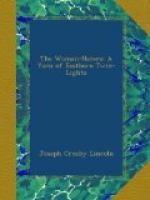“Oh, them two young fellers that always used to come to the cottage—what you call the bungalow—across the cove there, the ones I told you about. They was real friendly, sociable young chaps, and I kind of liked to have ’em runnin’ in and out. Seems queer to have it July, and they not here to hail me and come over to borrow stuff. And they was forever settin’ around under white sunshades, sloppin’ paint onto paper. I most wish they hadn’t gone to Europe. I cal’late you’d have liked ’em, too.”
“Perhaps,” said the helper, doubtfully.
“Oh, you would; no perhaps about it. It don’t seem right to see the bungalow all shuttered up and deserted this time of year. You’d have liked to meet them young painters; they was your kind.”
“Yes, I know. Perhaps that’s why I shouldn’t like to meet them.”
“Hey? . . . Oh, yes, yes; I see. I never thought of that. But ’tain’t likely they’d know you; they hailed from Boston, not New York.”
“How did you know I came from New York? I didn’t tell you that.”
“No, you didn’t, that’s a fact. But, you said you left the city where you lived and came to Boston, so I sort of guessed New York. But that’s all right; I don’t know and I don’t care. Names and places you and me might just as well not tell, even to each other. If we don’t tell them, we can answer ‘don’t know’ to questions and tell the truth; hey?”
One morning about a week later, Brown, his dish washing and sweeping done, was busy in the light-room at the top of the right hand tower, polishing the brass of the lantern. The curtains were drawn on the landward side, and those toward the sea open. Seth, having finished his night watching and breakfast, was audibly asleep in the house. Brown rubbed and polished leisurely, his thoughts far away, and a frown on his face. For the thousandth time that week he decided that he was a loafer and a vagabond, and that it would have been much better for himself, and creation generally, if he had never risen after the plunge over the steamer’s rail.
He pulled the cloth cover over the glittering lantern and descended the iron stair to the ground floor. When he emerged into the open air, he heard a sound which made him start and listen. The sound was the distant rattle of wheels from the direction of the village. Was another “picnic” coming? He walked briskly to the corner of the house and peered down the winding road. A carriage was in sight certainly, but it was going, not coming. He watched it move further away each moment. Someone—not the grocer or a tradesman—was driving to the village. But where had he been, and who was he? Not Seth, for Seth was asleep—he could hear him.
The driver of the carriage, whoever he was, had not visited the lights. And, as Atkins had said, there was nowhere else to go on that road. Brown, puzzled, looked about him, at the sea, the lights, the house, the creek, the cove, the bluff on the other side of the cove, the bungalow—ah! the bungalow!




